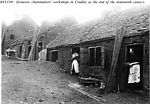 Domestic Chain-shops in Cradley
Domestic Chain-shops in Cradley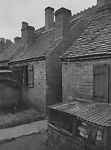 Domestic Chain-Shop
Domestic Chain-Shop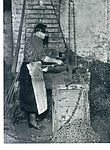 'Ommerin Amidst the Grime
'Ommerin Amidst the Grime Image from Period Postcard
Image from Period Postcard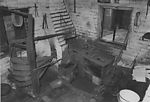 Interior of Domestic Chain-Shop
Interior of Domestic Chain-Shop Chain-shop Interior
Chain-shop Interior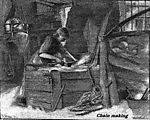 Chain-making by Tom Hill
Chain-making by Tom Hill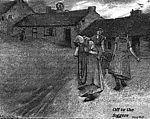 Off to the foggers by Tom Hill
Off to the foggers by Tom Hill

The domestic chain industry formed a vital part of the overall industry, and was a means by which mostly women could supplement the family income, whilst still being at home to look after the children, and provide support for her chainmaking husband, who may spend much of his income on beer.
A domestic workshop in the chainmaking industry was a private house with a workshop to the rear. No mechanical power was employed and would have consisted of a hearth, bellows for blast (air) and tools. The work was the same as in the factories, except that only small chain, mainly for agricultural and domestic use, was made.
The factory owners would not employ enough people to fulfil all of their orders, so some were subcontracted out to middlemen, who would act as agents for the larger manufacturers. These middlemen would then place the work with the domestic workshops, providing the homeworkers with the iron rod they would need, the homeworkers supplying their own breeze (coke) and blast.
The wrought iron rods were weighed prior to delivery or collection by the homeworker or middleman. When wrought iron is heated to welding temperatures it is subject to “scaling” and loses some of its weight, so 8lbs (3.6kg) in every 112lbs (50kgs) was allowed as wastage. The finished chain was weighed in, and this was the basis for the payment to the chainmaker.
A skilled and experienced woman could make about 280lbs (127kgs) of 3/8in (10mm) chain per week. This was the largest size of chain women were allowed to make, the larger and higher quality chain being reserved for men, whose income was deemed a higher priority.
The domestic industry was blighted by unscrupulous middlemen, who were known as “foggers”. They could cheat the chainmaker in various ways, such as supplying false weights for iron rod or the finished product. Sometimes outworkers were paid in the form of “truck”, consisting of tokens in place of money, that could only be spent in what was called a “Tommy Shop”, a shop owned by the fogger selling goods at inflated prices. It took three Acts of Parliament to eliminate this practice, which did not cease completely until the start of the 20th century. The foggers were the parasites of the domestic chainmaking industry, making money at the expense of the workers, without ever having to lift a hammer.
All members of the family may have been involved in this domestic industry, from the grandparents to the youngest grandchildren. There tended to be more women, girls and young boys in the domestic industry than men, as the men could get better paid work in the factories. Also, the women working from home had greater flexibility with regard to their hours, so they were able to look after the children of the extended families as well as completing their other domestic chores. It was common for them to be working into the evening. Eventually a by-law was passed preventing them from working beyond 9pm, due to the complaints from neighbours about the continuous hammering.
Rollover the captions in the box to see the available images in thumbnail format, click the caption to see the full-size image
| Reference: | 659 |
| Keywords: | |
| Archive Ref: | K.G. Lib 1994/013/1250 |
| Updated: | Thu 7 Jun 2007 - 10 |
| Interpretation written by | Louis Howe |
| Author's organisation | Curatorial |
| Organisation's website |